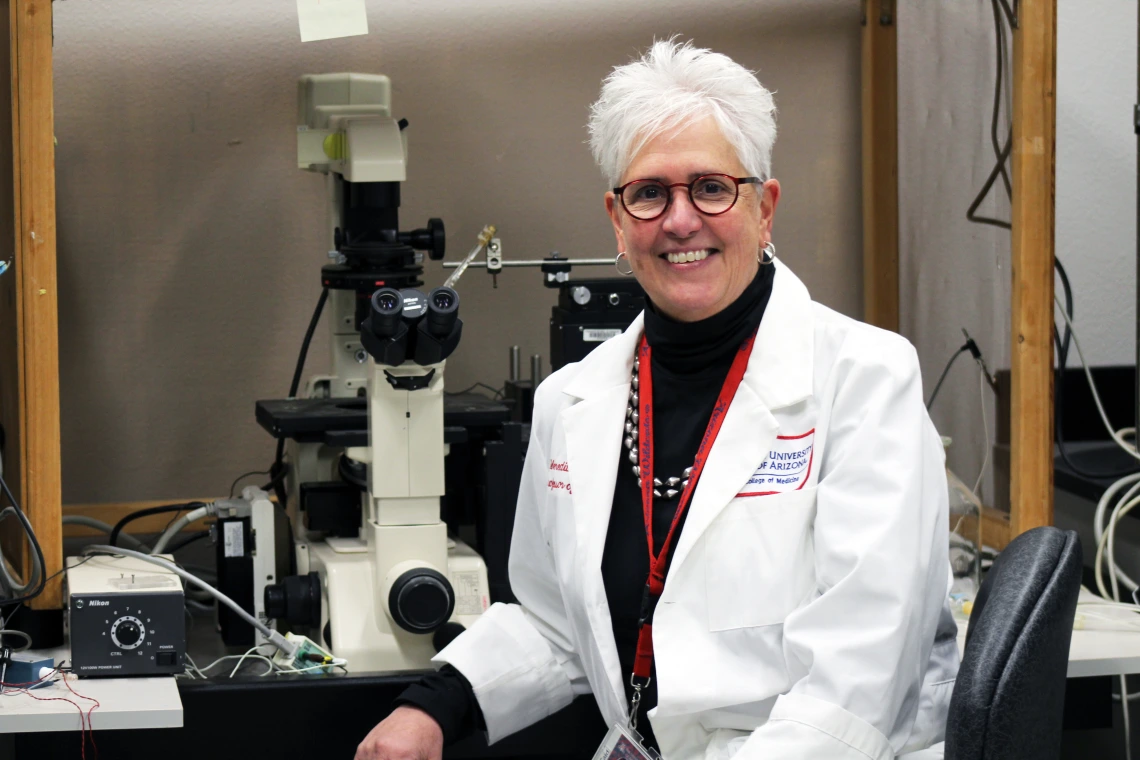Dr. Hay earns grant to develop new therapeutics for vascular dementia
Novel peptides to treat vascular dementia are expected to begin clinical trials next year

The National Institute on Aging, an institute within the National Institutes of Health, recently awarded Meredith Hay, PhD, professor of physiology at the University of Arizona College of Medicine – Tucson, a four-year, $8,817,641 grant to continue her team’s work on developing new therapeutics to treat vascular dementia, which is the second-most common type of dementia and accounts for 17% to 30% of all cases of dementia according to Alzheimer’s Disease International. Vascular dementia can cause memory issues, confusion, personality changes, and problems with movement, concentration and communication.
Dr. Hay explains that vascular dementia is caused by decreased blood flow to the brain, which deprives it of the oxygen it needs to function properly, often leading to inflammation. In addition, scientific studies have linked early Alzheimer’s disease to inflammation in the brain. There are currently no effective treatments for inflammation-related brain disease and memory loss.
Dr. Hay and her team have designed novel peptides, which are chains of amino acids that can be used to treat disease, that work with brain blood vessels and the brain itself to inhibit inflammation and improve blood flow. With the help of Tech Launch Arizona, the university’s commercialization arm, the team has protected and licensed these peptides to ProNeurogen, Inc., a startup they launched to bring the technology to doctors and their patients.
Since 2015, Dr. Hay’s team has raised over $25 million in external funding to develop these novel peptides. The hope with this round of funding from the National Institute on Aging is to begin clinical trials in vascular dementia patients next year to determine if their new therapeutic, called PNA5, is safe and effective.
“We are extremely grateful for the support from the National Institute on Aging at the NIH and to the Arizona Alzheimer’s Consortium for their outstanding support of our efforts to bring these new therapies to patients who are suffering from this neglected brain disease,” Dr. Hay said.
Dr. Hay’s collaborators at the University of Arizona include Todd Vanderah, PhD, pharmacology department head, John Konhilas, PhD, associate professor of physiological sciences, Bellal Joseph, MD, FACS, chief of the division of general surgery, Robin Polt, PhD, professor of chemistry and biochemistry, and Lee Ryan, PhD, psychology department head. Dr. Hay has a long-standing collaboration with Tech Launch Arizona to ensure that the new therapeutics the team is developing are protected so they can be effectively brought to market, from research to innovation to impact.
This area of research is of particular importance to Dr. Hay, who lost her mother due to complications from vascular dementia. After a breast cancer diagnosis and chemotherapy treatment, her mother suffered an undiagnosed heart failure, which progressed to vascular dementia.
“While my mother survived the cancer, the chemotherapy had damaged her heart, which ultimately led to dementia, which she eventually died from,” Dr. Hay shared. “I knew then that we had to find a way to develop new drugs to help patients suffering from vascular dementia.”

